American Public Mostly Ignoring War In Afghanistan
Eighteen years after it started, the American public seems to be mostly ignoring the war in Afghanistan. But that isn't an excuse for not bringing it to an end.
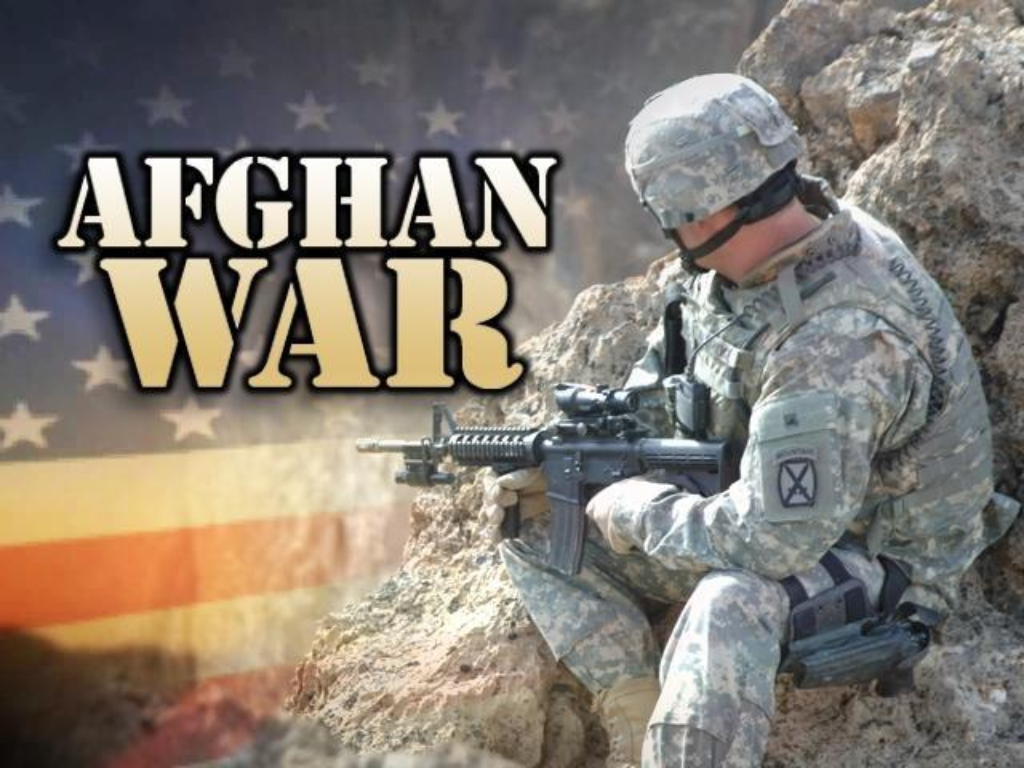
Next month we will mark the 18th anniversary of the beginning of the Afghanistan War, a conflict that began in response to the terrorist attacks unleashed on the nation 18 years ago last Wednesday by Osama bin Laden and his al Qaeda terrorist network. In the immediate aftermath of the attacks, it didn’t take long for American intelligence to determine who was responsible for what remains the greatest act of mass murder in American history and, soon after, to determine that bin Laden and his al Qaeda network were being given refuge by the Taliban government in Afghanistan. That is why, after warning the Taliban that we intended to retaliate against al Qaeda and against anyone providing them refuge — something directly authorized by the Authorization for Use of Military Force passed overwhelmingly be Congress just weeks after the September 11th attacks.
That was in 2001, though, and much has changed since then. Al Qaeda has been chased from its mountain redoubts in Afghanistan and has largely been forced underground to the extent it still exists. Despite this, American troops remain in Afghanistan despite promises by Presidents Bush, Obama, and Trump that our commitment there would eventually be coming to an end. It’s true that the size of the American and allied force in place in Afghanistan today is significantly smaller than it was at its height, but those forces remain. Additionally, while the original mission given to the United States military was a counter-terrorist operation aimed at al Qaeda, that mission changed to a counter-insurgency operation aimed at the Taliban and the civil war that has been going on in the country between the government in Kabul and anti-government forces, including the Taliban.
For the most part, the War in Afghanistan has been Ameria’s forgotten war. To a significant degree that’s because it doesn’t get the kind of in-depth coverage that the Iraq War. Indeed, at this point, the only times Afghanistan is in the news is when there is a terrorist attack in Kabul or another major city, or when an American soldier dies. It is also likely why, according to a new Gallup poll, public opinion about the war is at best mixed:
WASHINGTON, D.C. — Peace negotiations between the U.S. and Taliban negotiators collapsed this past weekend. The cancellation of the talks leaves the future of the war in Afghanistan in question, as Americans’ views of the war effort are holding steady from Gallup’s last measure, conducted four years ago, with 43% currently saying it was a mistake to send troops there and 52% saying it was not a mistake.
These data come from Gallup’s latest survey, conducted Aug. 15-30, as peace talks took place between U.S. and Taliban negotiators in Qatar. Gallup asked a similar question concerning the wisdom of the war in Afghanistan from November 2001 through May 2011 and found majority support for the war throughout the period. In November 2001, shortly after the U.S. sent troops to Afghanistan, 9% of Americans said the war was a mistake, while 89% believed it was not. By July 2004, the percentage expressing opposition to the war had increased to 25%; it reached 43% in August 2010. Since then, opinions have largely stabilized, including 39% of Americans saying the war was a mistake and 58% saying it was not shortly after the death of Osama bin Laden in May 2011.
In all but one post-2011 reading, the slight majority of Americans have continued to say the war was not a mistake, as they do today, while just over four in 10 have said it was a mistake. The lone exception came in 2014, after then-President Barack Obama announced a plan for the withdrawal of most U.S. forces.
As this chart shows, public opinion on the war has been roughly consistent for the past six years:
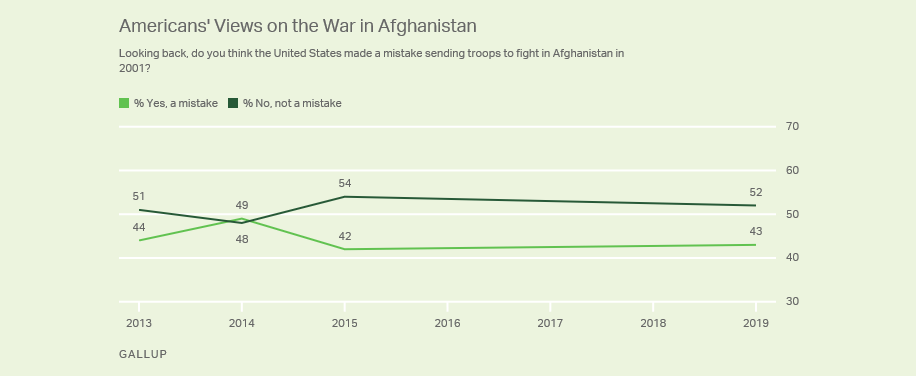
There is, however, a significant partisan divide on the question of whether or not the war was a mistake:
While a slight majority of Americans overall do not see the war in Afghanistan as a mistake, there are substantial partisan differences on the question. Currently, there is a 28-percentage-point gap between Democrats and Republicans who view the war as a mistake. This has been a consistent pattern since 2013, a period that covers the Obama and Donald Trump administrations. Throughout this time, Democrats have been about twice as likely as Republicans to say the war started by Republican President George W. Bush in 2001 after the 9/11 attacks was a mistake.
Among political independents, views that the war was a mistake have fluctuated from a low of 42% in 2013 to a high of 51% in 2014.
The evolution of that partisan divide over time can be seen in this second chart:
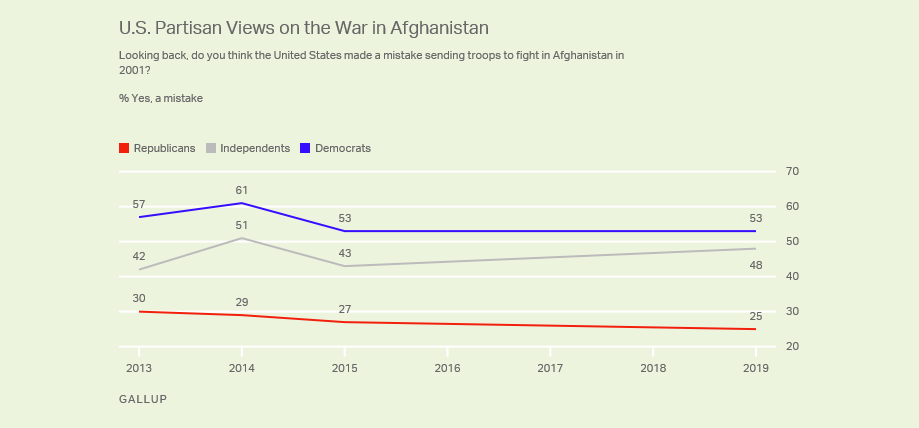
Gallup sums up the finding of its poll and what it means for future American policy:
During his campaign for the presidency, Trump was critical of the war in Afghanistan and promised to end the conflict. Despite this pledge, Trump committed to sending more troops to the country in 2017. However, from that point until Trump’s cancellation of the negotiations, his administration had strongly pushed for a peace treaty with the Taliban to bring an end to U.S. involvement in the conflict. Concurrent with these talks, Taliban forces have continued their attacks throughout Afghanistan, and the government of the country has essentially been excluded from the negotiations.
Americans’ views of the war in Afghanistan appear to have stabilized, remaining more positive than negative on balance. Should Trump or a future Democratic president move to fully end U.S. involvement in Afghanistan, this is unlikely to change.
Quite honestly, our current strategy, which I outlined as best I could back in December of last year, seems like a strategy that is guaranteed to fail. Yes, it’s true that we have ongoing military commitments that have lasted far longer than our involvement in Afghanistan has, but that misses the point.
American forces have been in Europe, principally Germany, and the United Kingdom, since the end of World War Two, for example, but they haven’t been involved in anything approaching active combat for seventy-two years now. The same goes for the American forces in Japan, although our bases there did serve in a support role during the Korean War and, to some extent, during the Vietnam War. We’ve had troops in South Korea since the armistice was signed in 1953, but again there hasn’t been anything approaching a combat situation there in sixty-four years. The same is true about commitments elsewhere in the world for the most part.
American forces in Afghanistan, though, have been involved in combat in some form or another on a non-stop basis since October 2001, and that doesn’t even count the activity that may have been engaged in by Special Forces or CIA assets during the Soviet occupation and the years leading up to the September 11th attacks. And it looks like this status will continue to be the case for the foreseeable future. Doesn’t there come a time when we just have to tell the Afghans that we can’t do this anymore and they’re going to have to learn to either resolve their differences through negotiation or handle this civil war on their own?
It seems obvious to me that the answer to that question is yes, and that the time to tell the Afghans that their future is in their own hands is now. Any more American or allied deaths in Afghanistan are utterly unnecessary casualties in a war we should have concluded years ago.


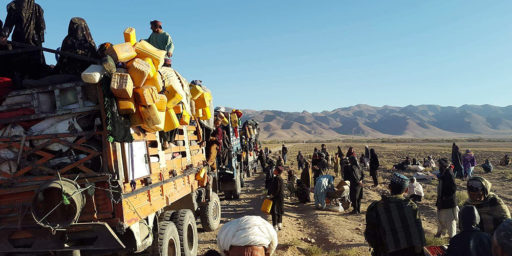
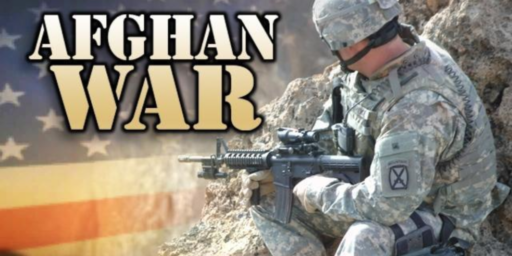

How long have we been in Afghanistan? The Army adopted the camouflage uniform pictured at the top of the post in 2005, four years into the war. It has subsequently not only phased out that uniform but replaced it with at least three different patterns since.
I think most people would judge the war came to a conclusion when bin Laden was dispatched by the SEAL team eight years ago.
Americans have been overwhelmed by the shit-show here at home.
I count myself among the lucky to have survived the Great Recession without losing everything. It was nip and tuck for a while.
And just when we thought we’d caught our breath, when we thought maybe the daily struggle wouldn’t be quite so intense, along comes Trump.
May 10, 2018, Dame Magazine –
Why Are More Women Committing Suicide?
June 15, 2018, The Economist –
America’s rising suicide rate – Deaths of despair
Dec 4, 2018, Pacific Standard –
The U.S. Suicide Rate is the Highest in a Half-Century
May 30 2019, Rolling Stone –
All-American Despair
..a suicide epidemic fueled by guns, poverty and isolation has swept across the West, with middle-aged men dying in record numbers
June 13, 2019, ABC –
Find out why middle-aged white men have the highest suicide rate in America
June 20, 2019, Time –
U.S. Suicide Rates Are the Highest They’ve Been Since World War II
Aug 22, 2019, The New Republic –
I Work With Suicidal Farmers. It’s Becoming Too Much to Bear
Sept 10, 2019, Insider –
Suicide is skyrocketing in young people, even as deaths from accidents, cancer, and murders are down
And yesterday marked the first annual ‘Farmer Suicide Prevention Day‘ in Kentucky.
(of course this one demands a giant – WTF!! – I surely hope those Kentuckians brought in a wagon load of pinatas in the shape of Mitch McConnell, Matt Bevin, Rand Paul, Tom Massie and Donald Trump!!)
Afghana..where?
How many trillions is it?
Doesn’t there come a time when we admit to ourselves that we can’t do this any more and that we’re going to have to learn that our propensity for violence rarely solves anything?
The response to an attack on the US should not be proportionate. Proportionate response is just setting a market price for terrorism. Our response to 9/11 should have been a catastrophic counterattack, deliberately disproportionate, not an invasion. There is no real time limit on how long we can drop bombs, the tick-tock starts once we commit troops.
If we invade, the rational goal is to remake the society we’re invading, and to remake it permanently – Japan and Germany 1945. If you do decide to invade then be clear on what that entails: hundreds of billions of dollars, decades of occupation, a level of brutality and cultural annihilation with which we are no longer comfortable. You can’t just plant some Marines and prop up some corrupt local pol and imagine that you’ve fundamentally altered the situation. What would have been required was a degree of dominance over the locals that would have had a Victorian-era aristo adjusting his monocle and saying, “That’s a bit much, what?”
Oh, and when considering alternatives, maybe consider looking at a fking map. Because on my maps it says quite clearly that we are helpless in Afghanistan without either Iran or Pakistan. Where were the wise old warriors who focus on logistics over tactics? No one asked how we’re going to run fuel and food and equipment to a landlocked country surrounded by people who hate the US? No one asked what price we’d pay in our relationship with the corrupt, terror-sponsoring, Pakistanis?
When I say things like ‘catastrophic counterattack’ many on the left get upset. But here’s the reality: we were going to respond, it was not possible not to respond. We did what seemed like the minimal thing – we engaged the Northern Coalition, used air power and knocked the Taliban out of Kabul. It had that illusory sense of proportion and surgical precision. Special forces on horse back, how romantic. And now it’s 19 years later and we’re still spending and killing and dying and accomplishing absolutely nothing. Had we literally dropped nukes on various mountain passes we’d have killed far fewer people, lost none of our own, spent pennies, and would have sent the message that you do not fck with a superpower and expect to live to see sunrise.
Proportionate response is one of those things that sounds decent and moral and sensible. It’s not. When a guy punches you in the nose, you don’t punch him back and then trade punches for 19 years. A guy punches you in the nose you take him down so hard he’s going to the ER and on to months of physical therapy. Unless of course you enjoy being punched in the nose.
The simple reality is that our political class is too afraid of getting blamed for any bad consequences if we withdrawal. So it’s easier to just stay and talk as little as much about it and pass the hot potato onto the next person. Sad that political cowardice seems to be one of the few areas of bipartisanship that are left.
@Andy: Quite, hence my stated opinion that if Trump’s dumb enough to be the guy who “lost Afghanistan”, he deserves our support. On that one thing.
A massive raid to destroy Al Qaeda in Afghanistan and capture or kill bin Laden would have been the appropriate response. We did that, until W seemed to lose interest. Then we just hung around for no obvious reason and with no apparent plan.
@michael reynolds:
I’m not sure I would call 150k dead (and about an equal number injured) proportionate. And this was not a state-sponsored attack, so I don’t think that our past responses to Germany and Japan are apt. WWII is simply not the best model for thinking about this conflict. In fact, is the very word conflict even correct?
I don’t think that’s the only message we would have sent. The other superpowers would have heard one thing, the Western world another, and the remaining countries yet another. And I shudder to think of what we would be telling ourselves now.
In any case, what we did do certainly didn’t work apart from decapitating Al-Qaeda. Perhaps we should have blown stuff up real good, admired it from afar, then gone home.
@Andy: “The simple reality is that our political class is too afraid of getting blamed for any bad consequences if we withdrawal. ”
I don’t know if the war was ‘winnable’; I don’t even know what ‘winning’ would have looked like.
To me, Dubya definitely lost the war when he shifted forces to Iraq, giving Al Qaida and the Taliban a few years to adapt and fight back.
At that point, the war was going to go on a loooooong time, because the President who ends it is the President who loses it.
@michael reynolds: Except for the fact that the target was so small and scattered that there was no way to respond massively to it…
And anything that normalizes the use of nuclear weapons likely causes more damage to us in the medium-long term than al Qaeda ever could do.
And you’re assuming that a small group of radicalized extremists that can hide in and flow through a population actually gives a f.ck about that population.
High cost that the targets only pay a tiny fraction of? Not a meaningful deterrent.
I’m not opposed to some atrocities (war is nothing but atrocities), I would just want them to be effective and not create worse blowback. Taliban leadership hanging from a long row of gallows, after a splashy show trial, and documented by some award winning photographers would have been nice.
But more than that, we should have been committing enough force to crush the Taliban, and not just dislodging them from Kabul. Instead we divided our power with the war of choice in Iraq.
You’re confusing a poorly executed strategy for a bad strategy.
@Barry:
“Winnable” depends on the political objectives of the war. The mistake Bush made actually had nothing to do with moving forces, it was the adoption of “nation building” as the objective for Afghanistan once the Taliban and AQ were routed and largely driven into Pakistan.
President Obama doubled-down on that strategy with the Afghan “surge” which was doomed to fail from the start. It took the deaths of over 1500 Americans to get us back to square one. Yet nation-building is still the strategy today, but I suppose we can take comfort that most people now realize it’s a futile effort and therefore it’s minimally resourced. That’s cold comfort to the families of those who are still dying though.
I still have friends who deploy to Afghanistan, so for me it’s still very personal.
@Kit:
I’m sure I wouldn’t.
That’s a really good point. WWII was 1) a total war, 2) our allies faced existential threats (France and Poland, among others, ceased to exist as coherent national-political entities), 3) three nations were attempting to establish hegemonic domination over large areas of the world.
Total war means entire countries are involved in the war effort. this implies most agricultural production winds up feeding the armed forces, and most resources extracted, including oil, and most manufacturing output wind up in the armed forces. We haven’t seen that since then.
Some countries have faced an existential threat. South Korea and Israel are good examples. But none have tried to conquer vast territories or otherwise impose dominance in large areas. Not through military force.
Therefore no wars have been fought like WWII since then.
What we’ve had in large numbers are insurgencies, and those are very hard to fight successfully. They kind of wax and wane, but hardly ever stop. the fight just goes on and on, with some major attacks now and then by both sides (if there are only two sides), and usually end in some form of political settlement.
Wars don’t have a time lock. If we were to leave there is great probability that Afghanistan would again become a terrorist haven and all the work we have done would be for naught with a fair chance we would need to return. The low level war that we have now is not a detriment to the US forces and does bring a modicum of stability. Now, I don’t profess to have a final answer as long as the the Pakistan armed forces support the Taliban and the Saudi money keeps flowing, not to mention the poppy fields. The point is that these problems won’t go away just because we ignore them- but the ongoing low intensity battle does more good than harm to American interests.
@michael reynolds: The USA did not undertake a total war in Afghanistan because it was deemed to be too costly an undertaking. The Soviet Union, not known to be a bunch of pussies, conducted a war there in the 1980s. They had as many as 115,000 troops in country at the peak. They suffered more than 14,000 KIA and 50,000 WIA. I suspect that American war planners did not want to pay that kind of price.
We think that with our advanced technology we can sit back safely and bomb some third world primitives into submission. The reality is that the American public is willing to be taxed for the latest and greatest gadget, but we are running out of space in Arlington. The Korean War cost 33,000 lives; Vietnam 55,000, and the American public grew sick of this auto-de-fe. I suspect that the people planning the incursion into Afghanistan considered that the type of plan that you propose would cost 15-20,000 lives, and they were unwilling to take that risk. In late 2001, the US refused to commit 1,000 troops to the fighting at Tora Bora for fear of casualties, and bin Laden made his escape.
I am not saying that you are wrong, Michael. I am saying that the US does not want to incur the casualties that such military undertakings always require.
@Kit: Oh, that was mean. True, but mean.
@Slugger:
But we would incur zero casualties if we just bombed. Look, we are Dwayne (the Rock) Johnson. We are very large, very strong. They are, let’s say, Rorschach from Watchmen, small, ruthless, wily. We can stand off and punch all day long, and do it in such a way that they can’t punch back at all. But for some reason The Rock has decided to exchange punches with Rorschach, with the caveat that the Rock will only punch as hard as Rorschach does. That makes a weak adversary into an equal. Stupid.
That’s the thing: we are punching way below our weight. Why? Because we decided to. We made a decision to half-ass this because mushy-headed people think war is supposed to be fair and Bush thought we should all go shopping. War is not supposed to be fair. Fair war is war without end. Fair would have been responding to Pearl Harbor with a proportionate attack on a Japanese naval base. That’s not what we did. Our response to Pearl Harbor was to burn their cities to the ground, occupy their country and dictate how life was going to work going forward. And how much trouble have the Japanese been since?
@gVOR08: Fuk! I’m even willing to go with accepting it when he says “I did the greatest of any world leader ever in Afghanistan. Great. Absolutely amazing. No one ever did Afghanistan as well as I did.”
@Slugger:
That’s exactly right. Up until about 2007 we wanted to keep the troop numbers as low as possible because we believed, based on the Soviet experience, that Afghans were extremely xenophobic.
The difference between WWII and Afghanistan is that Germany and Japan were well established and coherent countries with high levels of social cohesion that allowed them to be reconstituted with relative ease.
Afghanistan, by contrast, is, at best, a rump state created by colonial powers as a buffer between empires. The result is an unstable population lacking social cohesion bound inside unnatural borders. Afghanistan is a barely viable state in the best of times.
While it is understandable why Bush decided to invade Afghanistan, the
dangerresult was going to be that we would become trapped in a quagmire. The Ruskies were trapped for a decade, the Brits for 25 years. Afghanistan isn’t a country, it is a conglomeration of fiefdoms controlled by warlords, there is no way to install top down political order.I preferentially hire ex-military and reservists. The reservists still deploy there. Every time one of the wives call me when they are gone I cringe, especially since they all have young kids. My group has always been good about looking after the family when guys deploy and sending the deployed people stuff they need, but if I am honest we have been slacking off a bit the last couple years. Its hard to think about them if the war is essentially forgotten.
Steve
@michael reynolds:
…and accomplish zero objectives. You are overestimating, by orders of magnitude, what can be accomplished through bombardment without a ground assault.
@Andy:
Mark your calendar, Andy — we are in complete agreement.
Americans think in terms of nations. They really have no concept of how little people in Afghanistan care about ‘Afghanistan’ as a thing, or how many other places around the world feature ‘nations’ that are arbitrary borders drawn without regard for the actual mutually-loathing populations they contain.
@James Joyner: “It has subsequently not only phased out that uniform but replaced it with at least three different patterns since.”
Wow.
@DrDaveT:
We better both go out and buy lottery tickets. Split the take when one of us inevitably wins? 🙂
@Barry:
And that’s just the Army. There was a very stupid – and very expensive – uniform arms race between the military services over the last two decades. The Marine’s started it, but they only changed once and did it right the first time – except for making it so the other services couldn’t copy their camo pattern.
Americans ignore the Afghanistan War because it is not a war. We remain as garrison troops because we fear what would happen if we withdrew military support from the existing government.
This is the 21st century version of seige warfare and we are the defenders.
We possess fortified positions and sometimes give a sortie battle. We lack the troops to occupy and defend the whole battlespace.
It’s not a war.
I say it again because I said it then: We never should have invaded. Period. We were never going to invest the necessary resources to win and that was obvious then to anyone paying attention and it is obvious now to all. Even the people who continue to support this idiocy do so not out of any conviction that we will “win,” but because they are afraid of being “losers,” which they are silly enough to think we can avoid that stink just by virtue of not acknowledging the obvious.
As @Kit: said,
@Andy: “And that’s just the Army. There was a very stupid – and very expensive – uniform arms race between the military services over the last two decades. The Marine’s started it, but they only changed once and did it right the first time – except for making it so the other services couldn’t copy their camo pattern.”
As usual, the Army brass f*cks the dogs on uniforms.
When I came in, we were issued two sets of khakis (among other things), which were immediately phased out in favor of the green shirt.
And having everybody wear fatigues for everything is the sort of stupidity that would appear in Dilbert cartoons.
@de stijl: “Americans ignore the Afghanistan War because it is not a war. We remain as garrison troops because we fear what would happen if we withdrew military support from the existing government.”
Somebody described it as a 19th century British imperial frontier war (like – oh, Afghanistan!). It’s not a major war, it’s fought by small groups of regulars, and the public is only aware when something makes page 1.
@Barry:
At this point, Afghanistan is a combination of a police action holding the status quo, and a realistic training arena for newish SO types.
The positive effect of regional quasi stability vs the outlay of treasure and blood.
We can’t “win” and we don’t want to seem to “lose”. We cannot learn from history apparently.
Some years back at the school where I was studying public policy I got to attend a seminar run by a history professor from one of the US war colleges. A fair summary of the material on Afghanistan outside of the cities would be along the lines of, “They are the best insurgency troops in the world. Harassing invading armies has been their national pastime for 4,000 years. When there is no invading army, they practice on the tribe in the next valley over. If you are the invading army, the winning strategy is always to find an excuse to declare victory and go home. Some armies take longer to figure that out than others, but they all do eventually.”
@DrDaveT: Depends on what your goal is. If the goal is only to have a tantrum, or disrupt and/or take the lives of random people, then bombs are as good as anything else.